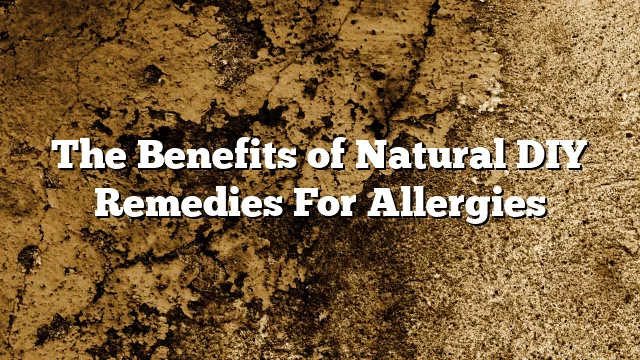
Millions of Americans suffer from allergies that cause itchy noses, runny noses and itchy eyes. While prescription may provide temporary relief from allergy symptoms, natural home remedies and diet changes may provide long-term control over symptoms.
Use saline nasal rinses to relieve congestion with premeasured kits available at most drugstores or use a neti pot instead. Also consider quercetin and butterbur as antihistamine herbs with properties.
1. Vitamin-C-Rich Foods
Allergies are an outward sign that your immune system is fighting back against invading allergens such as pollen, mold spores, dust mites, pet dander and proteins found in certain foods. When exposed to an allergen, immune cells respond by producing histamine to fight it off; histamine’s response then leads to runny noses, sneezing fits, itchy eyes and watery eyes – classic symptoms of seasonal allergies.
Vitamin C is an all-natural antihistamine and multiple studies have demonstrated its ability to alleviate allergy symptoms. While over-the-counter allergy medicines such as loratadine and cetirizine block histamine receptors, Vitamin C works differently by decreasing how much histamine your body produces itself.
Diets high in Vitamin C should consist of eating nutrient-dense foods such as brightly-colored fruits and vegetables such as berries, oranges, tomatoes, dark leafy greens and cruciferous vegetables.
Yogurt can also help allergy sufferers. Packed with probiotics that can reduce inflammation and allergic responses in your body, yogurt can provide essential support.
Aspiring for at least 500-2,000mg of Vitamin C daily should be your goal, preferably through fruits and vegetables. As Vitamin C is water-soluble and must be consumed frequently in order to prevent deficiency – getting your daily dose will not only benefit allergy symptoms but will strengthen overall immunity too!
2. Local Honey
As pollen counts increase to unacceptably high levels this spring, allergy sufferers are scrambling for any source of relief they can find – not unlike local honey. Honey has long been touted as an all-natural allergy remedy and consuming local honey regularly throughout spring (or when your allergies flare) may help build resistance against allergens that exacerbate symptoms.
Researchers conducted an experiment to test this theory by dividing allergy sufferers into three groups and giving each of them raw, locally-harvested honey, national pasteurized honey or a placebo made from flavored corn syrup for one month. After that period, those who consumed local honey had reduced symptoms compared to those who consumed national pasteurized honey.
But the study’s results weren’t conclusive; other factors could have contributed to its findings. First of all, it can be hard to know exactly how much local honey will help an individual with allergies since each person’s immune system and allergy profiles vary; additionally, eating local honey doesn’t precisely mimic allergen immunotherapy treatments which slowly introduce pollens that trigger your allergies over a longer period of time.
If you decide to experiment with local honey, make sure it’s raw and harvested from a nearby beekeeper. Ideally, honey harvested within 50 miles should provide optimal pollen concentration levels – just one teaspoon daily should do the trick. For added allergy-fighting power, mix your honey with supplements such as stinging nettle or quercetin as well as essential oils like eucalyptus or frankincense essential oil blends.
3. Herbs
Seasonal allergies are no easy thing to manage, with their itchy eyes, runny nose and sneezing making life uncomfortable for sufferers. While there is no magic cure-all medication out there that may provide temporary relief from allergy symptoms, natural DIY remedies offer real hope to allergy sufferers without negative side effects or serious withdrawal symptoms.
Essential oils can be an effective remedy to clear nasal passages, helping ease congestion and itching. Essential oils may be applied topically on wrists or inhaled through aromatherapy diffusers for inhalation; bath salts containing menthol-based essential oils have proven especially useful at opening sinuses and soothing allergy symptoms.
Other herbs can also help alleviate allergy symptoms. Stinging nettle has long been recognized for its curative qualities and one study from 2017 demonstrated this fact. Butterbur is another herbal option; just be sure that any product purchased contains products processed to remove chemicals known as pyrrolizidine alkaloids that could otherwise damage livers and kidneys.
Apple cider vinegar can also help relieve allergy symptoms by slowing the immune system’s reaction to pollen, and taking an allergy supplement such as Sinupret that includes European elderflower, sorrel, cowslip verbena and gentian root may provide further support.
Finding the source of your allergies is ideal, but in the meantime these natural antihistamines can make symptoms more manageable. While it’s wise to consult your physician first before trying anything new, lifestyle adjustments could make a difference between feeling miserable and living comfortably. Incorporating some DIY solutions along with prescription or over-the-counter medications for maximum effectiveness.
4. Probiotics
Now it is widely acknowledged that having a strong immune system starts in the gut, where over 80% of your immune function resides. Furthermore, research indicates that probiotics (good bacteria found in your body) may help alleviate allergy symptoms.
Probiotics are beneficial bacteria found in your digestive tract and intestines – also known as your microbiome – which are essential in keeping unhealthy bacteria at bay and supporting gut cells from becoming compromised, thus helping prevent illness while supporting immunity and supporting intestinal cell health. Probiotics also promote healthful bacteria while breaking down food into short-chain fatty acids which aid digestion as well as strengthening immunity systems.
Research so far on probiotics and allergies is encouraging, with most studies showing they can alleviate allergy symptoms. It’s important to remember, though, that the benefits of different probiotic bacteria vary by strain – each strain has unique mechanisms which interact with our immune systems in different ways, according to Reid. Consuming one type of probiotic in hopes it’ll aid irritable bowel syndrome may not work out so well –
One study demonstrated how E. coli Nissle 1917 probiotic can reduce seasonal allergic rhinitis and improve quality of life for those living with hay fever, perhaps as a result of increasing proportion of “regulatory” T-cells within your body.
Probiotics can easily be added to your diet through plain yogurt; eating it as part of breakfast or lunch, using it in sauces or salad dressings, and baking recipes using it are all easy ways of increasing probiotic consumption. Just be sure your yogurt labeled with “live cultures,” since the best probiotics have more active microbes.
5. Exercise
If you are one of the millions of allergy sufferers unable to find relief through medical means alone, natural remedies may offer temporary respite – but for longer-term solutions it may be worth consulting an allergist as well.
Start by eating a diet rich in nutrients to support immune function. Supplement with natural antihistamines like spirulina or stinging nettle; alternatively try nasal irrigation and essential oils such as those containing menthol; this could also help open your sinuses if they’re overreactive to nasal passages.
Exercise can also help ease allergy symptoms, but outdoor workouts during periods with high pollen counts should be avoided as much as possible. If exercising outside, wear wraparound sunglasses to protect your eyes from pollen getting into them. Indoor exercises such as yoga, Pilates or weight training may be more suitable options than working out during high pollen counts if possible; and try working out later when pollen counts have decreased.
Meditation can help lower stress levels that contribute to allergies. Furthermore, humidifiers are great way to eliminate dust and allergens from your home environment.
Keep your allergy symptoms under control with natural methods – whether medication or immunotherapy – while still enjoying this season by visiting an allergist for diagnosis and treatment plan (Wyndly allows you to book appointments online, 24/7). Good luck this year with keeping allergies at bay while making the most out of every season!
